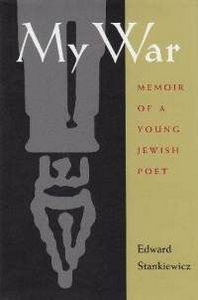"In this unusual memoir, Edward Stankiewicz stirringly recalls his youth as a Polish Jew beginning with prewar Warsaw through to the Nazi invasion. A life on the run lands Stankiewicz in Soviet-occupied Lwow where in time he joins the Lwow Literary Club. A friend of Jewish, Yiddish, Polish and Soviet poets and writers, he offers rare insights into wartime Eastern European intellectual life." "After the German occupation of Lwow, in the newly built Jewish ghetto, he works in German military outfits and learns to forge Aryan and German documents to help people escape. In a German uniform he escapes to the Eastern Ukraine where he wanders for several months from town to town. Captured by the Gestapo, he is shipped to Buchenwald where he survives as a Pole. In the camp he manages to produce Polish and German poetry and a play. Some of these poems are reproduced in the book." Stankiewicz unflinchingly addresses such significant issues as identity, loyalty, betrayal, anti-Semitism, and communism. Writing in a spare, accessible style, this is a unique personal account of Jewish life in Eastern Europe during the Holocaust and of a young man's determination to overcome extreme adversity and pursue his spiritual and professional calling as a poet.
<br>
| LoC Classification |
DS135.P63S7247 2002 |
| Dewey |
940.53/18/092 |
| Edition |
1st ed. |
| Nationality |
Polish |
| Pub Place |
Syracuse |
| Cover Price |
$29.95 |
| No. of Pages |
208 |
| Height x Width |
10.4
x
5.4
inch |
|
|
|
|
Edward Stankiewicz begins by describing his life in prewar Warsaw--his schooling, early love of Latin, and graduation from his gymnasium in 1939 shortly before the German invasion--and his escape to the Soviet-occupied zone. In Lwow (Lemberg) where he attended the university as a student of classics, he began writing Yiddish poems and joined the Writers' Club where he met other Jewish and Polish writers.
After the Germans occupied Lwow, he was forced to work in a factory that provided the German army with leather and pelts. Later, in a German uniform, he fled to the Ukraine where he wandered from town to town for several months until he was captured by the Gestapo, beaten, and sent to Buchenwald.
There, as a Pole hiding his Jewish identity, he ended up working as a scribe in the block for sick and dying prisoners. He also managed to continue writing poems, some of which are reproduced in this book.
As hellish as Buchenwald was, the fact that its political prisoners had for the most part wrested control of its inner workings from the camp's criminal prisoners, meant that there was something of a buffer between the prisoners and the SS in charge of the camp. This situation allowed the prisoners to exact their own justice. Twice Stankiewicz saw prisoners kill other prisoners who had been kapos at other camps ("Buchenwald was meting out justice the prisoners' way."). Toward the end of the book the author describes the day--April 11, 1945--the camp was liberated by the Americans.
The author's passion for poetry and language runs like a thread through the entire book (he is professor emeritus of Slavic linguistics and literary theory at Yale University). His memoir is an important source of new information and insights about previously little known aspects of wartime Eastern European intellectual life, as well as a moving story of survival against incredible odds.
--Charles Patterson, Ph.D., author of ETERNAL TREBLINKA: Our Treatment of Animals and the Holocaust
